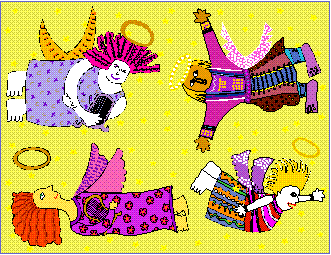
Monday, March 2
Readings: Leviticus 19:1-2,11-18; Psalm 19, Matthew
25:31-46
The Law of the Lord is true, just, perfect, and gives wisdom to the simple, sings today's Psalm.
This is the first clue.
Don't lie, steal, or cheat your workers. Don't take advantage of people. Do render true and
impartial judgment. Don't spread slander and do be in solidarity with your neighbors. Don't
hate, seek revenge or nurse grudges. Do love your neighbor as yourself. Also in this chapter are
laws requiring Israel to preserve a place for the economic activity of poor people (which may be
summarized, do leave a place for the poor and don't squeeze them out of existence). These are
all clues. Even I can understand this language.
A thousand or so years later along comes Jesus, and does he have anything sensible to say? Feed
the hungry, give water to the thirsty, welcome the stranger, clothe the naked, visit the sick and
don't forget those in prison. As if that wasn't enough, he goes to say that if you do these things
for the least among us, you are doing them to Jesus himself. Or. . . not doing it, as the case may
be. Mother Teresa used to speak of the "distressing disguises" that Jesus wears when He is
among us. More clues.
Who can be against feeding the hungry. . . as long as it's not with my tax dollars. . . welcoming
the stranger. . . as long as it's not in my neighborhood. . . visiting the sick. . . as long as they
aren't on Medicaid.
Can the answer really be as simple as these readings suggest?
Not according to the conventional wisdom of the post-modern era. We are told there are two
choices, and two only: American-style corporate capitalism or Soviet-style collectivism. Yet,
Catholic social teaching looks at both and finds them wanting for their exaltation of capital and
production over the human person. Two choices. . . neither of them quite fit. . . what can this
mean? Is it possible that the conventional wisdom in this case is wrong and God is right?
Fifty years ago a Basque priest started a school in northern Spain. He taught reading, writing,
arithmetic, skilled trades -- and the social doctrine of the Catholic Church. Forty years ago some
of his students in a town called Mondragon decided he was serious and started a cooperative
business based on principles gleaned from their Catholic education. Today the Mondragon
Cooperatives collectively employ over 35,000 people, and are involved in everything from retail
distribution to the production of machine tools and consumer goods and most points between.
The moral is: When in doubt, remember that the law of the Lord is perfect and his ordinances
are true and just. If you're tempted to see this as just another pious platitude, go back and read
the previous paragraph again.
+ For the children of Iraq, who continue to suffer and die because of the embargo, that they will be comforted in the time of their despair and need, we pray to the Lord.
+ For all who are seeking alternatives to materialism and greed as a basis for human society, that
they will be strengthened and fruitful.
+ Start making a list of your virtues.
+ Commit a random good deed (a/k/a "mitzvah"). Alternatively, commit several random good deeds.